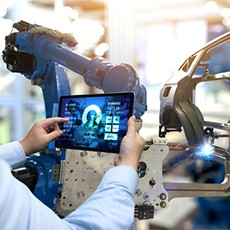Source – iotbusinessnews.com
Oracle is taking the Internet of Things to a new level with the announcement that its IoT cloud service will now incorporate artificial intelligence and machine learning to provide clients with better business data insights than ever. Oracle’s upgrade will include digital twin and digital thread capability, providing companies with an integrated analytical perspective on their entire supply chain. Companies will also be able to develop their own IoT field apps, which can then be integrated into a central analytics platform to provide real-time insights into business processes. As part of this update, Oracle is also introducing services that will empower IoT smart connected factories, fleet management and remote monitoring and repair.
Oracle’s move reflects its interest in capturing the B2B segment of the growing machine learning market. The machine learning as a service market was worth nearly $1 billion in 2016, which will grow to $16.4 billion by 2024, reflecting an annual compound growth rate of 43.7 percent. Fueling this growth are pioneering innovations in machine learning that make it increasingly invaluable to use of the Internet of Things. Here’s a look at three areas where machine learning innovations are transforming the IoT.
Integrating Machine Learning with Mobile Devices
Smartphones are one of the foundational components of the Internet of Things, and incorporating machine learning into mobile devices is one of the most important recent IoT developments. Machine learning requires enormous computing power and huge amounts of data, which normally exceeds the capacity of smartphones to download and process. Smartphone component manufacturers have been working to overcome this limitation by making mobile processors fast enough to handle machine learning.
This research and development has led to innovations such as Qualcomm’s Snapdragon 835 Mobile Platform, which builds machine learning capability directly into mobile devices. This empowers AI-dependent applications such as real-time virtual reality immersion, heightened sound quality generated by detecting and filtering out background noise and facial recognition security authentication.
Using Machine Learning to Navigate Autonomous Vehicles
One of the most dramatic developments in the Internet of Things is the emergence of self-driving cars and trucks. Machine learning is playing an essential role in empowering autonomous vehicles to navigate accurately and safely.
In order to navigate, autonomous vehicles must incorporate and analyze data from multiple sources, including internal vehicle sensors that monitor conditions such as engine performance and tire pressure, as well as external input from cameras, lidar, radar and wireless connections. Autonomous vehicles must use this data to perform tasks such as identifying lanes, landmarks and other vehicles, as well as predicting probable changes to existing conditions. Machine learning helps make this possible by making it easier for autonomous vehicles to identify objects and predict trends.
Incorporating Machine Learning into Smart Factories
Oracle’s IoT cloud upgrade includes support for smart factories, another major application of machine learning technology. Smart factories rely on the ability to analyze huge amounts of data coming in from sensors that monitor facilities and operations, keeping track of variables such as factory temperature and humidity that can have an effect on performance. By analyzing this data for trends, machine learning can predict future outcomes and enable companies to make adjustments that optimize productivity.
Companies such as GE, SAP, and Siemens have already invested billions in developing smart factory technology. One of the priority goals is developing the ability to predict mechanical problems before they arise, a task known as machine learning predictive maintenance (ML PdM). To facilitate the pursuit of this goal, the Industrial Internet Consortium recently launched the Smart Factory Machine Learning for Predictive Maintenance Testbed, a platform for exploring and evaluating machine learning techniques that can support predictive maintenance. The consortium aims to use this testbed to develop algorithms that can save manufacturers the expense of unnecessary maintenance downtime. By avoiding unnecessary downtime, machine learning holds the potential to significantly lower the costs of manufacturing and boost the economy. The consortium also hopes that the results of machine learning advances in manufacturing can be applied in other areas of industry.
By empowering mobile devices, autonomous vehicles and smart factories, machine learning innovations are boosting both the capability of the devices connected to the Internet of Things as well as the potential of the IoT as a whole. In the near future, you may be able to order an autonomous car built in a smart factory by speaking into a smartphone that recognizes your voice through technology powered by machine learning. In this and other ways, machine learning promises to transform the IoT and revolutionize the way we live.
